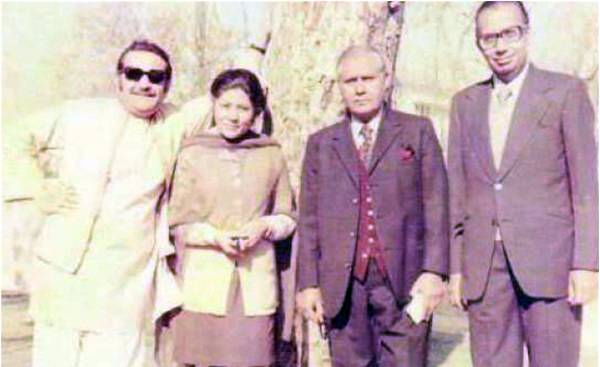
One of Pakistan’s famous novelists, Bano Qudsia, passed away this week in Lahore, aged 88. She is perhaps best known for her 1981 novel Raja Gidh (The vulture king) that explores ethical limits and the tension between haram and halal. She was also an acclaimed playwright, with Aadhi Baat considered a classic.
Bano Qudsia was born in 1928 in Ferozepur, India, and migrated to Pakistan after the Partition. She graduated from Kinnaird College in Lahore and completed her masters in Urdu from Government College, Lahore, in 1951.
She is pictured here with her husband Ashfaq Ahmed and Qudratullah Shahab, both eminent writers who have influenced at least two generations of Pakistanis, and the poet Ibn-e-Insha.
Both Ashfaq and Bano started off as fiction writers but moved to the didactic form of writing and public engagement, promoting resignation and a brand of Sufism in the 1980s under Gen Zia ul Haq. This was designed to breed acceptance of the regime and an increasingly religious state and society. Shahab, a seasoned civil servant, published an account of his life and career titled Shahab Nama in the 1980s and it remains a bestseller to date. In addition to recounting his experiences with Governor General Ghulam Mohammad, General Ayub Khan and other powerful rulers, Shahab also declared that he was aided by unseen, supernatural spiritual forces throughout his career. After his death Ashfaq and Bano Qudsia declared him to be a Sufi of the Awaisi order and his grave was turned into a saint’s tomb where an urs is also celebrated.
The fourth person in this photo is Ibn-e-Insha, a celebrated poet, famed for his modern day classic ghazal, Insha Ji Uttho. Nadeem F. Paracha has written about how this ghazal was considered cursed as Ustad Amanat Ali Khan died a few months after performing it on PTV in January 1974. The ghazal was a hit. But then Ibn-e-Insha died exactly four years after the broadcast, in January 1978. Amanat Ali’s son Asad, also died shortly after performing the ghazal. Asad’s brother Shafqat Amanat Ali refuses to ever sing it.
Bano Qudsia was born in 1928 in Ferozepur, India, and migrated to Pakistan after the Partition. She graduated from Kinnaird College in Lahore and completed her masters in Urdu from Government College, Lahore, in 1951.
She is pictured here with her husband Ashfaq Ahmed and Qudratullah Shahab, both eminent writers who have influenced at least two generations of Pakistanis, and the poet Ibn-e-Insha.
Both Ashfaq and Bano started off as fiction writers but moved to the didactic form of writing and public engagement, promoting resignation and a brand of Sufism in the 1980s under Gen Zia ul Haq. This was designed to breed acceptance of the regime and an increasingly religious state and society. Shahab, a seasoned civil servant, published an account of his life and career titled Shahab Nama in the 1980s and it remains a bestseller to date. In addition to recounting his experiences with Governor General Ghulam Mohammad, General Ayub Khan and other powerful rulers, Shahab also declared that he was aided by unseen, supernatural spiritual forces throughout his career. After his death Ashfaq and Bano Qudsia declared him to be a Sufi of the Awaisi order and his grave was turned into a saint’s tomb where an urs is also celebrated.
The fourth person in this photo is Ibn-e-Insha, a celebrated poet, famed for his modern day classic ghazal, Insha Ji Uttho. Nadeem F. Paracha has written about how this ghazal was considered cursed as Ustad Amanat Ali Khan died a few months after performing it on PTV in January 1974. The ghazal was a hit. But then Ibn-e-Insha died exactly four years after the broadcast, in January 1978. Amanat Ali’s son Asad, also died shortly after performing the ghazal. Asad’s brother Shafqat Amanat Ali refuses to ever sing it.

